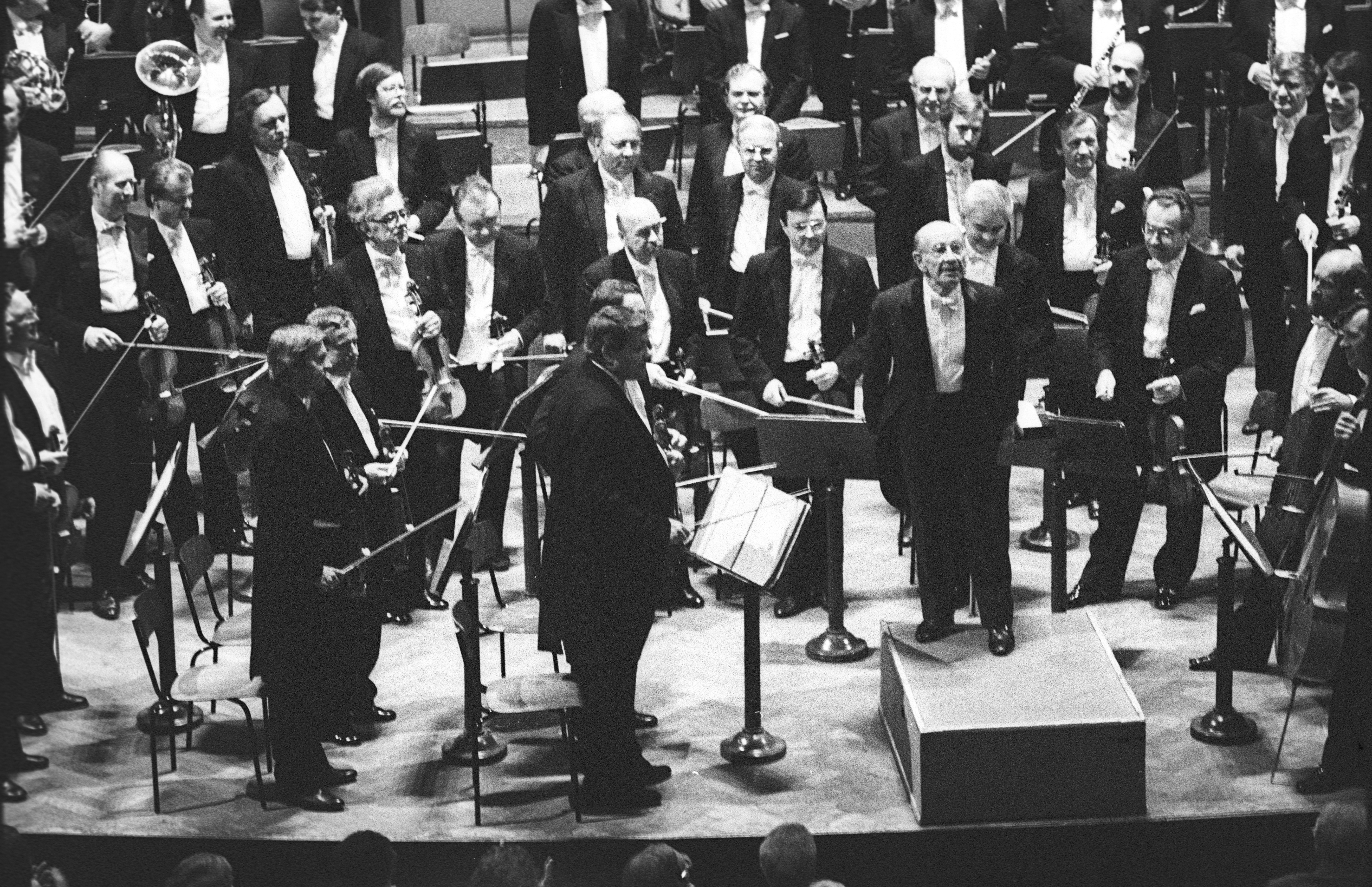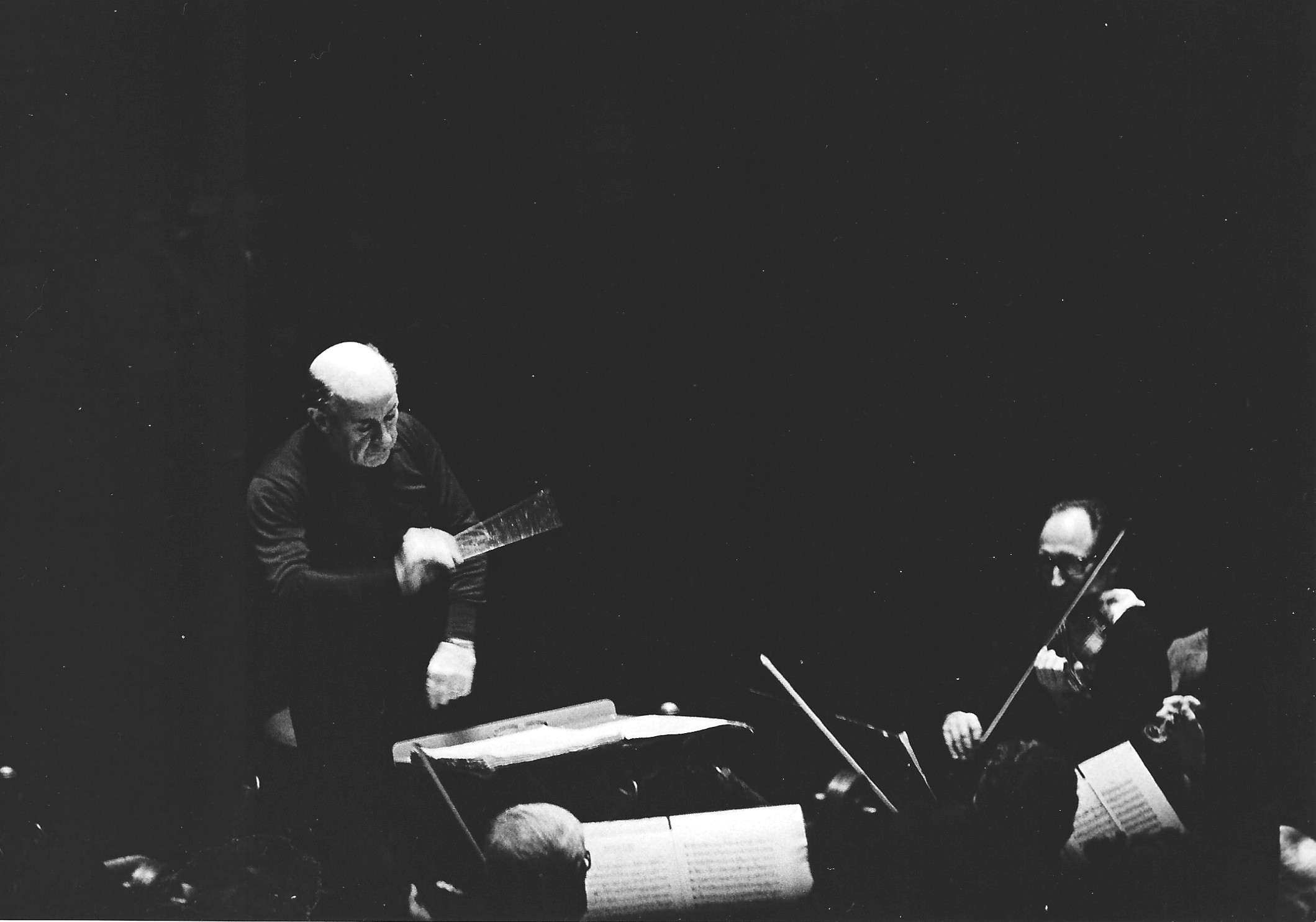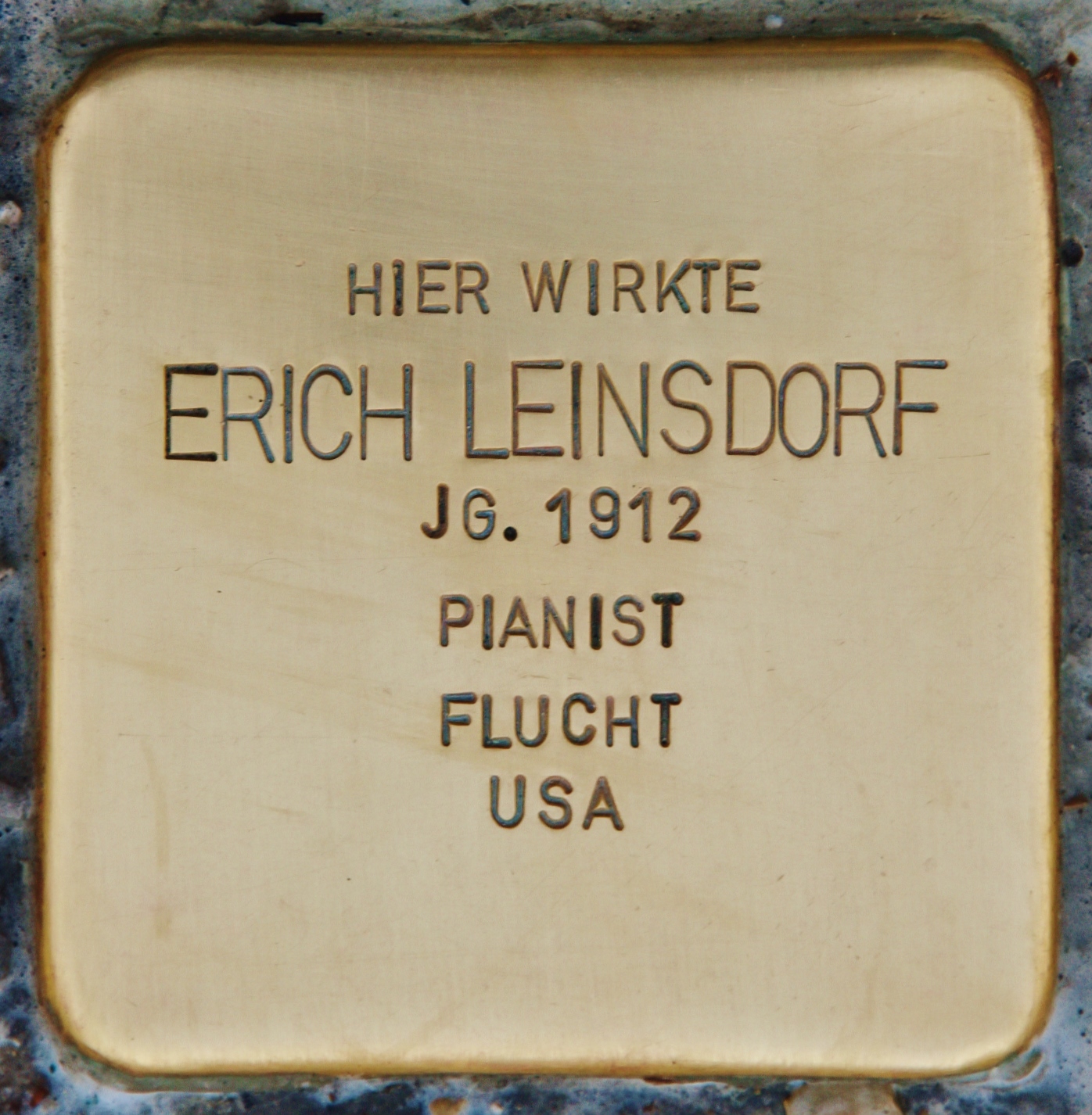1. Overview

Erich Leinsdorf (born Erich Landauer; February 4, 1912 - September 11, 1993) was an Austrian-born American conductor renowned for his extensive career with leading orchestras and opera companies across the United States and Europe. He earned a reputation for maintaining exceptionally exacting standards in his performances, though he was also known for his often acerbic personality. Leinsdorf's contributions to classical music extended beyond the podium, as he significantly influenced the dissemination of music through prolific recordings and published several books and essays on musical matters. His artistry was characterized by a broad adaptability, excelling in both operatic and symphonic repertoires, and his work played a role in shaping the American classical music landscape.
2. Early Life and Education
Erich Leinsdorf's formative years were spent immersed in music, laying the groundwork for his distinguished career.
2.1. Childhood and Musical Education
Born Erich Landauer in Vienna, Austria, on February 4, 1912, Leinsdorf came from a Jewish family, with his father being an amateur pianist. He began studying music at a local school by the age of five, quickly developing proficiency in the cello and composition. In his teenage years, he gained practical experience as a piano accompanist for singers. His formal musical education continued with studies in conducting at the Mozarteum in Salzburg, and he later pursued further studies in cello and piano at the University of Vienna and the Vienna Academy of Music.
2.2. Early European Career
From 1934 to 1937, Leinsdorf served as an assistant to two of the most celebrated conductors of his time, Bruno Walter and Arturo Toscanini, at the prestigious Salzburg Festival. This period provided him with invaluable mentorship and exposure to the highest echelons of classical performance. During these formative years, he also began to take on his own conducting engagements, leading an opera in Bologna, Italy, in 1936. In 1937, he made his debut at the Metropolitan Opera in New York City, conducting Wagner's opera Die Walküre, before undertaking further activities in France and Italy.
3. Immigration to the United States
Leinsdorf's move to the United States was a pivotal moment in his life and career, influenced by the escalating political tensions in Europe.
3.1. Metropolitan Opera Debut and Early US Activities
Leinsdorf's departure from Austria was significantly aided by Charles Edward Marsh, an American newspaper owner and investor whom he met at the 1937 Salzburg Festival. Marsh was instrumental in assisting Jewish musicians in emigrating to the United States during this tumultuous period. Through Marsh's intervention, Leinsdorf traveled to the United States in November 1937, securing a position as an assistant conductor at the Metropolitan Opera in New York City. This timely relocation occurred just a few months before the Anschluss of March 1938, when Nazi Germany annexed Austria, making a return to his homeland dangerous. With further assistance from Marsh's acquaintance, Lyndon B. Johnson, then a freshman Representative from Texas and later President of the United States, Leinsdorf was able to remain in the country. He became a naturalized American citizen in 1942.
At the Metropolitan Opera, the 26-year-old Leinsdorf quickly distinguished himself, particularly for his interpretations of Richard Wagner's operas. Following the sudden death of conductor Artur Bodanzky in 1939, Leinsdorf was appointed the Met's "head of German repertoire," a significant role that solidified his reputation in the operatic world.
4. Major Conducting Career
Erich Leinsdorf held significant leadership roles with several prominent American orchestras and opera companies, where he left a notable impact despite facing various challenges.
4.1. Cleveland Orchestra
In 1943, Leinsdorf was among the leading candidates, including Vladimir Golschmann, Albert Stoessel, and George Szell, considered for the music director position of The Cleveland Orchestra. Despite concerns about his young age of 31 and relatively limited experience conducting outside of opera, he won the board's vote and became the orchestra's third music director. During his initial year in Cleveland, Leinsdorf introduced significant changes, including scheduling the entire season in advance to promote concerts and reach a wider audience. He also aimed for a year-round schedule for the orchestra, though this ambition was complicated by the ongoing World War II. A major achievement was the successful negotiation of weekly radio broadcasts on Sunday evenings, which allowed The Cleveland Orchestra to be heard across the United States, parts of Mexico, and via shortwave radio throughout Europe, South America, and the South Pacific. Crucially, concerts were recorded and broadcast to American military zones overseas, providing morale to troops during the war.
However, Leinsdorf's tenure was brief. In October 1943, he received a draft notice for military service, despite his health problems. He publicly affirmed his commitment, stating, "I intend to abide by the orders of my government." Although his time in the Army was short, with an honorable discharge in September 1944, the orchestra had already begun considering his replacement, George Szell, who made a highly acclaimed debut in November 1944. While Leinsdorf remained under contract, his authority as music director diminished, leading to compromises on various artistic decisions. He eventually submitted his resignation as public opinion shifted towards Szell. Nevertheless, after Szell's death in 1970, Leinsdorf regularly returned to conduct The Cleveland Orchestra as a guest conductor through the 1980s, notably serving as a "bridge" conductor during the transition period between music directors Lorin Maazel and Christoph von Dohnányi from 1982 to 1984.
4.2. Rochester Philharmonic Orchestra
Leinsdorf served as the principal conductor of the Rochester Philharmonic Orchestra from 1947 to 1955. During this period, he expressed significant frustration with what he perceived as the "insular musical culture" and narrow musical understanding of Rochester's citizens. He famously remarked, "Rochester is the best disguised dead end in the world!" reflecting his despair over the local music scene.
4.3. Boston Symphony Orchestra

In 1962, Leinsdorf was appointed music director of the Boston Symphony Orchestra. His tenure in Boston was prolific, resulting in many recordings for RCA, but it was also characterized by controversy due to his frequent clashes with musicians and administrators. A particularly historic moment occurred on November 22, 1963, during a Boston Symphony concert, when Leinsdorf had to interrupt the performance to announce the shocking news of President John F. Kennedy's assassination in Dallas, Texas. To a stunned audience, he expressed his indignation at the act and sorrow for the President, then led the orchestra in a performance of the Funeral March from Beethoven's Third Symphony. He also conducted Mozart's Requiem at a memorial mass for President Kennedy, a performance later released on CD.
4.4. Other Orchestral and Opera Engagements
Following his time in Rochester, Leinsdorf briefly served as head of the New York City Opera before resuming his association with the Metropolitan Opera. From 1978 to 1980, he was the principal conductor of the Berlin Radio Symphony Orchestra (now the Deutsches Symphonie-Orchester Berlin).
His career also included other notable engagements. In 1967, he was scheduled to guest-conduct the Israel Philharmonic Orchestra, but he had to return home abruptly due to the outbreak of the Third Middle East War, in such a hurry that he forgot to take off his tuxedo. Zubin Mehta stepped in to conduct the concert during the wartime conditions. In 1974, while guest-conducting Wagner's Tristan und Isolde at the Metropolitan Opera, Leinsdorf publicly criticized the management, including Music Director Rafael Kubelík and Principal Conductor James Levine, in The New York Times for their perceived inability to handle singer cancellations stemming from financial difficulties. This critique is believed by some to have contributed to Kubelík's subsequent resignation. Despite this, Leinsdorf continued to guest-conduct at the Metropolitan Opera, though his demanding nature often led to conflicts. After leaving his permanent directorships, he continued to guest-conduct operas and orchestras around the world for the next two decades, maintaining a particularly strong association with the Metropolitan Opera and the New York Philharmonic.
5. Guest Conducting and Later Career
Following his departure from the Boston Symphony Orchestra in 1969, Leinsdorf ceased holding permanent directorships. However, he remained highly active, dedicating the next two decades of his career to extensive guest-conducting engagements with leading opera companies and orchestras worldwide, including continued associations with the Metropolitan Opera and the New York Philharmonic.
6. Musical Style and Reputation
Erich Leinsdorf earned a widespread reputation for his exceptionally exacting standards in performance, a characteristic that often accompanied his famously acerbic personality. His conducting approach was marked by a broad adaptability, allowing him to excel in both operatic and symphonic repertoires. Some critics noted that his style developed a distinctly "Americanized" element during his extensive career in the United States. While admired for his precision and intellectual rigor, his demanding nature and candid observations sometimes led to clashes with musicians and administrators. His critical remarks about the musical culture in Rochester and the management at the Metropolitan Opera underscore his forthright and often uncompromising approach to his profession.
7. Recordings and Media Presence
Leinsdorf's extensive recording career and presence in visual media significantly contributed to the dissemination and appreciation of classical music globally.
7.1. Recording Output
Leinsdorf recorded prolifically throughout his career. His early discography includes 78-rpm discs for RCA Victor and Columbia Records with The Cleveland Orchestra. In the early 1950s, he recorded all of the Mozart symphonies for Westminster with the Royal Philharmonic Orchestra. He also initiated a highly regarded series of recordings with the Rochester Philharmonic Orchestra for Columbia, featuring a performance of Beethoven's Eroica that was noted for its intensity, rivaling that of Toscanini.
In the 1960s, Leinsdorf made several stereo recordings with the Los Angeles Philharmonic, the Philharmonia Orchestra, and a Los Angeles pick-up orchestra known as The Concert Arts Orchestra for Capitol Records. He also recorded Brahms' First Symphony, Franck's Symphony in D Minor, and the Mendelssohn First and Grieg piano concertos for RCA Victor with pianist Ania Dorfmann and the Philadelphia Orchestra, credited as the Robin Hood Dell Orchestra on disc.
Beginning in 1957, Leinsdorf served as conductor for a series of complete stereophonic opera recordings made in Rome, commencing with Puccini's Tosca featuring Zinka Milanov, Jussi Björling, and Leonard Warren for RCA Victor. He continued to record for RCA Victor as music director of the Boston Symphony Orchestra, with notable releases including works by Mahler and Bartók, the complete Beethoven and Brahms symphonies, and a live recording of Mozart's Requiem performed in memory of President John F. Kennedy. Later, he made additional operatic recordings, including the first complete stereo recording of Erich Wolfgang Korngold's Die Tote Stadt, with Carol Neblett and René Kollo for RCA. Leinsdorf conducted the Boston Symphony with pianist Artur Rubinstein in Rubinstein's second complete recordings of Beethoven's piano concertos, Brahms' First Piano Concerto, and Tchaikovsky's First Piano Concerto. He also conducted a complete recording of Wagner's Lohengrin with the Boston Symphony, a massive and expensive undertaking that, at the time, was the first Wagner opera recorded with a major US orchestra. While it was initially announced that Leinsdorf and the Boston Symphony would record all of Prokofiev's major works, by the end of his tenure, only symphonies 2, 3, 5, and 6, the violin concertos, the five piano concertos, music from Romeo and Juliet, the Scythian Suite, and the Symphony-Concerto for Cello had been recorded and issued. Many of his RCA Victor recordings were sometimes criticized for being affected by the company's controversial Dynagroove process.
For Decca/London, Leinsdorf recorded many Mozart operas, including Don Giovanni, Così fan tutte, and The Marriage of Figaro, as well as a highly regarded recording of Wagner's Die Walküre. After leaving Boston in the 1970s, Leinsdorf returned to Decca/London to record several releases in their acclaimed Phase 4 Stereo project, notably Stravinsky's The Rite of Spring and Petrouchka. In the 1980s, Leinsdorf recorded three direct-to-disc albums with the Los Angeles Philharmonic for Sheffield Lab. He is also recognized for his arrangements of orchestral concert suites drawn from major operas, including Debussy's Pelléas et Mélisande, Wagner's Parsifal, and Richard Strauss's Die Frau ohne Schatten.
7.2. Awards and Honors
Leinsdorf received numerous accolades throughout his career, including seven Grammy Awards and a total of 12 Grammy nominations. His Grammy Awards include:
- 1961 - Best Opera Recording (for Turandot)
- 1964 - Best Opera Recording (for Madama Butterfly)
- 1964 - Best Orchestral Performance (for Bartók: Concerto for Orchestra)
- 1965 - Best Orchestral Performance (for Mahler: Symphony No. 5 / Berg: Excerpts from Wozzeck)
- 1967 - Best Orchestral Performance (for Mahler: Symphony No. 6)
- 1969 - Best Opera Recording (for Così fan tutte)
- 1972 - Best Opera Recording (for Aida)
7.3. Visual Media Appearances
Leinsdorf's presence extended to visual media, bringing his performances to a wider audience. On video, he conducted the Vienna Symphony in Johann Strauß: Famous Works, released on Silverline Classics in 2003. A number of his televised performances with The Boston Symphony Orchestra have been released on DVD by VAI and ICA Classics, most notably a critically acclaimed color performance of Tchaikovsky's Fifth Symphony taped in April 1969.
Leinsdorf and the Boston Symphony Orchestra regularly appeared on local broadcasts from WGBH-TV and nationally on PBS in the Evening at Symphony broadcasts. On August 17, 1967, Leinsdorf conducted the Boston Symphony Orchestra in a two-hour primetime special telecast in color on NBC, a reflection of a time when commercial networks periodically broadcast full-length classical concerts. The program, titled An Evening at Tanglewood, featured violinist Itzhak Perlman as guest soloist.
8. Writings on Music
Erich Leinsdorf authored several influential books and essays that offered insights into music, composition, and his own extensive career. His published works include:
- Cadenza: A Musical Career (1976)
- The Composer's Advocate: A Radical Orthodoxy for Musicians (1981)
- Erich Leinsdorf on Music (1997)
9. Personal Life
Erich Leinsdorf was born into a Jewish family in Vienna, and his father was an amateur pianist, indicating an early exposure to music within his family.

10. Death
Erich Leinsdorf died of cancer on September 11, 1993, in Zürich, Switzerland, at the age of 81. He was interred in the Mount Pleasant Cemetery in Hawthorne, New York.
11. Legacy and Evaluation
Erich Leinsdorf's legacy is marked by his significant contributions to orchestral performance and recording, as well as a complex critical reception of his artistry and personality.
11.1. Impact on Classical Music
Leinsdorf's work had a profound impact on classical music, particularly through his efforts to broaden its accessibility. His initiatives, such as establishing weekly radio broadcasts for The Cleveland Orchestra, allowed classical music to reach a wider audience across the United States and internationally. His extensive discography, spanning numerous labels and encompassing a vast repertoire of operas and symphonies, further cemented his influence by making classical performances available to listeners worldwide. He was recognized for his broad adaptability in conducting, excelling in both operatic and symphonic works, and his career significantly shaped the classical music scene in the United States.
11.2. Critical Reception and Controversies
Leinsdorf was widely respected for his exceptionally exacting standards and intellectual rigor as a conductor. However, his professional reputation was also intertwined with his famously acerbic personality. He was known for his candid and often critical observations, which sometimes led to public controversies. For instance, he famously criticized the "insular musical culture" of Rochester during his tenure with the Rochester Philharmonic Orchestra. Later in his career, he publicly voiced strong critiques of the management at the Metropolitan Opera, particularly regarding issues like singer cancellations, which reportedly contributed to the resignation of Music Director Rafael Kubelík. These instances, alongside frequent clashes with musicians and administrators, underscore his uncompromising approach to artistic integrity, which, while admired by some, also generated friction throughout his career.